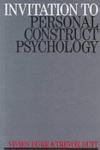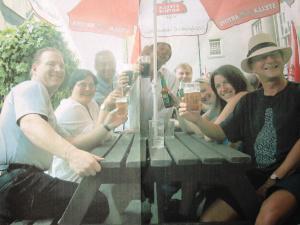Last week I found out that my dear friend, colleague and mentor, Trevor Butt, had died. It’s still very hard to believe that he is gone. I feel terribly sad that he didn’t have the time – freed up from work by his retirement – to explore the projects he was passionate about, and to get more of his wonderful writing out into the world outside of the constraints of academic frameworks.

Inspiration
Trevor had a huge impact on my life. It’s not exaggerating to say that I wouldn’t be where I am here, now, if it wasn’t for him.
Back in the early 2000s I had given up on being a researcher or a writer. I had done a PhD straight after my degree, mostly because I wasn’t sure what else to do, being too young to go straight into counseling. But a critical response in my viva, and on submission of my first publication, convinced me that I was no academic. I got a job teaching psychology and decided to stick with that.
Wandering around the second hand shops in Malvern one day I picked up a book called Invitation to Personal Construct Psychology, by Trevor and his close friend and co-author Viv Burr. I read it and re-read it. I still have the copious notes that I made on it filling much of my first ever journal (which now line the whole back of my wardrobe).

That book shaped everything that I’ve done since. It showed me that it was possible for academics to study what they’re passionate about. It introduced me to the constructionist/constructivist study of marginalised sexualities, genders and relationships, and gave me a kind of permission to explore those areas myself. It broke down the false boundaries I’d grown used to between psychology, sociology, philosophy, and psychotherapy. It demonstrated how our own personal experiences can be woven into our writing in ways which bring it to life. And it convinced me that academic theories can be deeply useful and relevant to the questions that I care most about, such as how to live our lives, and how to relate to ourselves and other people.
On a personal level, the questions that Trev and Viv raised about why we distinguish – in hierarchical ways- between lovers and friends has impacted hugely on the ways in which I navigate my own relationships, as well as making their way into much of my writing. Two of the most important people in my life – who I’ve had the longest relationships with – have been people I met through the connection with Trev: Alex Iantaffi and Darren Langdridge (who researched and wrote with Trev long before he and I researched and wrote together). Those relationships have also complicated all of the clear distinctions between friends, colleagues, partners and other kinds of relationship, which seems fitting really given where they began.
As I often told Trev, the only thing that saddened me about Invitation to Personal Construct Psychology was that this book that had helped me so much wasn’t in the self-help section of the bookshop, but the academic psychology section, where I found it. This meant that far too few people were likely to pick it up. That realisation was the first flicker of my own ongoing project to get these kinds of ideas out there more widely.
Mentor
A few years after I read that book, Trev and others at the University of Huddersfield put on a conference on personal construct psychology. I went along and presented a paper, and met Trev in person for the first time.
I’ll never forget that moment. So many times in my life I’ve finally had chance to talk to a hero of mine, or even work with them, and it’s been a painful experience. Often I just haven’t felt met by them: it’s seemed like a one-way encounter. And there’s frequently been a sense of somebody who talks the talk but doesn’t walk the walk of what they write about which so inspired me.
Of course it’s important to remember that our heroes are also human beings. It’s a kind of objectification to put them on a pedestal and to expect them to be perfect, or to assume that they will be able to be something for us simply because we admire their work. We can easily hurt them if we set them up to fail with all our expectations on them. Also life is a lot messier than writing. None of us can walk the walk all the time, or step outside of culture and completely live in the ways that we might advocate.
However, with Trevor I felt properly met. He was so warm and open and welcoming: so fascinated to hear what I thought about things rather than just telling me his opinions. As a junior academic it felt amazing to be instantly embraced and invited to join the conversations with Trev and his colleagues. That was the conference where I also met the wonderful Alex Iantaffi for the first time, and I have a strong memory the three of us sitting around in a halls of residence kitchen with Trev asking us enthusiastically all about our research and activism.

So another way that Trev has inspired me is in how to be as a person, particularly as I now reach a phase of my life where some people respond to my own writing, and perhaps see me as a mentor figure. I certainly don’t always get it right but I try hard to have time for people and to commit to listening to them even (perhaps especially) when they are making criticisms: to recognize that they will have always have areas of expertise to offer which I can learn from if I can stop and listen.
Trev is one of the – relatively few – people in my life who I’ve always felt able to be whoever I am with, rather than getting any sense that he wants me to be something for him. He also always showed total confidence in me, encouraging me to do what I cared about rather than suggesting that I should focus on this or that. I think that’s an incredibly rare gift and one I that I really hope to cultivate myself.
Understanding people
One of Trev’s more recent books is called Understanding People. You can read my review of it here. In it he explains some of his own research about people’s sense of self. He found that we experience ourselves in very different ways in different relationships, and yet we can feel that we are authentically ‘being ourselves’ in all of them.

I think this is such an important piece of research because it demonstrates clearly that our self, or identity, is not fixed and static, but rather fluid and ever-changing. That can be a huge relief in a world where we’re constantly encourage to scrutinise and monitor our self and find it flawed and lacking: where self-criticism is a – perhaps the – major component of so many mental health problems. You can read a blog post that I wrote about some of Trev’s further ideas on this here.
I drew heavily on these ideas and findings in the first chapter of Rewriting the Rules. Indeed they were probably a big part of the reason that I began that book with people’s relationships with themselves. I reflected there that it is often at funerals where we finally get to see all of the different selves that a person was: as we hear stories from the person who knew them as a parent, a sibling, a colleague, a friend, a mentor, a critic, a superior, a junior, and all of the other ways in which you can know someone. I look forward greatly to hearing about some of Trev’s other selves at his funeral next week and putting together a fuller, and more complex, picture of this person who I love.
The other way in which our selves are fluid is in how they change over time. Personal construct psychologists – and others – have written that we are like a flowing river, or a journey, rather than a static individual or identity which is fixed throughout time.
In this way, there is also a sense that we are not just a person who exists and then – at the moment of death – ceases to exist. Rather life is a series of births and deaths, as parts of us come into being and parts of us are lost. For example, certain versions of Trev came into being when he collaborated with Viv, or Darren, or me. And certain versions of him ended when he stopped clinical work, published his last book, or retired, for example. All of this starts before we are born, perhaps as our grandparents begin to imagine their kids having kids, or even when an ancestor imagines their impact on future generations. And it finishes long after we are dead, because we continue on in the memory of others and our impact upon their lives, and the lives that they touch.
That way of seeing things gives me something to hold on to through the waves of sadness that I’m feeling about the suddenness of Trev’s death, and the sense of an ending that came before he – or anyone else – was prepared for it. I know that I can have a role in keeping the memory of Trev alive, both in what I write and in how I – myself – live and relate to others.
Addendum: I also intend to start saying ‘nosebags’ whenever it’s time to eat in memory of Trev :-)
